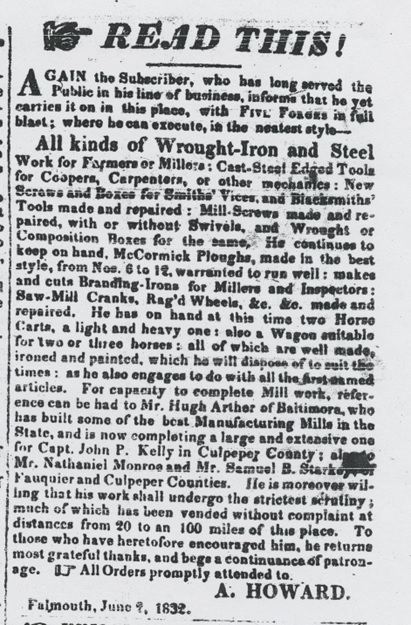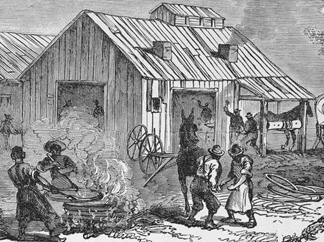Abram Howard’s Blacksmith Shop
From the 1720s until about 1800, Falmouth served as a primary shipping point for goods coming and going from the upper Shenandoah Valley. The town’s proximity to vital water power facilitated the growth of post-Revolution commercial flour and textile mills.
Falmouth’s industries supported a wide range of skilled and unskilled workers. The town included businesses such as stores, taverns, bakeries, barbers, physicians, and lawyers. The mills and warehouses also supported a full complement of tradesmen such as carpenters, coopers, joiners, masons, blacksmiths, weavers, tanners, mechanics, and others. Not the least of the tradesmen responsible for keeping Falmouth’s mills in operation were the blacksmiths, a number of whom worked in the town.
In years gone past, the blacksmith was an essential and familiar member of most communities. Most were capable of shoeing horses, repairing tools, and fabricating essential everyday iron or steel objects. Others were more highly skilled and capable of doing precise and demanding work. One of this latter group was Abram or Abraham Howard (ca.1800-1876) of Falmouth. Abram was one of several blacksmiths in Falmouth, a free black, and sometimes designated in the personal property tax records as a mulatto. Abram made and repaired items such as farm machinery and tools as well as doing the highly demanding work of repairing, modifying, and fabricating mill machinery.
Family researchers believe Abram to have been the son of John Howard and Elizabeth Dick of Stafford. In 1827, John and Elizabeth executed a marriage contract. Elizabeth owned “certain personal estate & household chattels” that were not to be under John Howard’s control. These included four cattle, five hogs, two beds, several tables and chairs, and all the “rest and residue” of the household and kitchen furniture consisting of “pots, ovens, tubs, &c, &c.” This may be the same John Howard who in 1801 was paid twelve shillings for making repairs on the forge mills near Falmouth.
John Howard may have been the son of Ann Howard (born 1720), a free black woman of Spotsylvania County. In 1758, the Spotsylvania church wardens bound out Ann’s children to serve Richard Tutt until they attained the age of twenty-one. The children named were Benjamin, Simon, Rebecca, Peter, Alexander, Eliza, William, John, and Rachel who had all been born during Ann’s years of freedom. Such intervention by the church was unusual unless the parent or parents were unable to feed and care for their children. Little is known about the years the Howard children remained in the Tutt household, but in 1771 Peter, Betty [sic], and Eliza Howard sued James Tutt, Richard’s son, for detaining them in servitude.
Abram Howard’s name first appeared in the local newspaper in early 1822. He was listed in the Stafford County personal property tax records from 1816 through 1835. By 1819, Abram’s partner in the blacksmith business was William Huntsman, another free black. Almost nothing is known of this man.
A fascinating though little-known phenomenon of the antebellum South was the owning of slaves by free blacks. Slavery was an integral part of the economic system and the need for labor transcended the lines of color. The type and quantity of work being done in Abram’s blacksmith shop required a great deal of labor, both skilled and unskilled. This seems to have been provided by his enslaved workers. Abram began with two slaves in 1816 and his ownership peaked in 1832 when he paid taxes on eleven. Sometimes black-owned slaves were wives and children of the owners and sometimes not. What, if any, family relationships existed between Abram and his enslaved workers is unknown.
Abram’s blacksmith shop was located on Lot 1 adjacent to the Falmouth mills. Now occupying part of this lot is Amy’s Café. Near his shop Abram also kept a tavern, an advertisement for this announcing, “House of Private Entertainment: Where his neighbors or the weary traveler can at all times be refreshed, and that with the nicest fresh Oysters if desired.”
In 1830, Abram advertised his Falmouth blacksmith shop in the local newspaper:
The Subscriber having lately visited the Cities of Baltimore, Philadelphia, and other parts of the North, as well for the purpose of being further instructed in Mill & other Machine Work, and procuring Tools necessary for the purpose of accomplishing such work; can now assure the public, that having succeeded in getting the Tools, he is prepared from an improved knowledge in his business, to execute in a most masterly manner, all the necessary Wrought-Iron Work, attachable to Mills or other Machinery, as also all Iron or Steel Implements required by farms (a constant supply of M’Cormick Ploughs from No. 4 to 10 will be kept on hand.) Superior Edge Tools &c. for Carpenters, coopers and other Mechanics. In the other named branches, he has long considered himself equal to any engaged in the same line of business; but now, with the assistance of costly and well chosen Tools, he is bold to assert that he can execute any work required, in a style superior to any man in this section of country. It would be useless to particularize Articles, as he feels confident there is nothing of quality to be made by a Blacksmith, or Iron or Steel, that cannot be procured on shortest notice, and most moderate terms, at his Shop—for having now four Forges in constant blast, and hands sufficient for a fifth, (now about to be erected,) no delay or disappointment can possibly be expected. For better answering employment for his forges and hands, he is keeping constantly for Sale, Gigs, Carryalls, Wagons, Carts, Drays, Wheelbarrows, &c. any of which, if not suitable at first call, can be made or altered to direction. He cannot conclude without tendering thanks to his former punctual customers, and assures them, as well as the public in general, that so far as unremitting attention, industry and low prices will ensure it, that he will receive a share of public patronage. For an examination or a description of his Mill-Work, he begs leave to refer those unacquainted with him, to John P. Kelly and James Wheatley, Esqrs. of Fauquier; Benjamin N. Barnet and Nathaniel Monroe, Esqrs. of Culpeper—and for information of his capacity to Make and Cut Branding Irons, he begs leave to refer to John Crump and William Stringfellow, Esqrs. Flour Inspectors of Fredericksburg and Falmouth; and for more complete satisfactory information, he desires a call at his Shop.
Abram Howard
Abram advertised his business again in 1832:
Again the Subscriber, who has long served the Public in his line of business, informs that he yet carried it on in this place, with Five Forges in full blast; where he can execute, in the neatest style—All kinds of Wrought-Iron and Steel Work for Farmers or Millers; Cast-Steel Edged Tools for Coopers, Carpenters, or other mechanics: New Screws and Boxes for Smiths’ Vices, and Blacksmiths’ Tools made and repaired; Mill-Screws made and repaired, with or without Swivels and Wrought or Composition Boxes for the same. He continues to keep on hand, McCormick Ploughs, made in the best style, from Nos. 6 to 12, warranted to run will; makes and cuts Branding-Irons for Mills and Inspectors; Saw-Mill Cranks, Rag’d Wheels, &c. &c. made and repaired. He has on hand at this time two Horse Carts, a light and heavy one; also a Wagon suitable for two or three horses; all of which are well made, ironed and painted, which he will dispose of to suit the times; as he also engaged to do with all the first-named articles. For capacity to complete Mill work, reference can be had to Mr. Hugh Arthur of Baltimore, who has built some of the best Manufacturing Mills in the State, and is now completing a large and extensive one for Capt. John P. Kelly in Culpeper County; also to Mr. Nathaniel Monroe and Mr. Samuel B. Starkey of Fauquier and Culpeper Counties. He is moreover willing that his work shall undergo the strictest scrutiny much of which has been vended without complaint at distances from 20 to an 100 miles of this place. To those who have heretofore encouraged him, he returns most grateful thanks, and begs a continuance of patronage. All Orders promptly attended to.
A. Howard
Falmouth
It’s not known how Abram financed traveling to the northern cities to further his training. His personal references mentioned in the two newspaper notices were all offered by leading men in milling and industry who were from a relatively broad geographical area. Obviously, Howard was well known and well respected by them.
Abram moved to Fredericksburg around 1835 and continued his blacksmithing business there. At some point, he started having financial problems. Due perhaps to old age, infirmity, or some unfortunate event, in 1871 and 1873 Abram was listed as an insolvent in Fredericksburg. He died in 1876.


